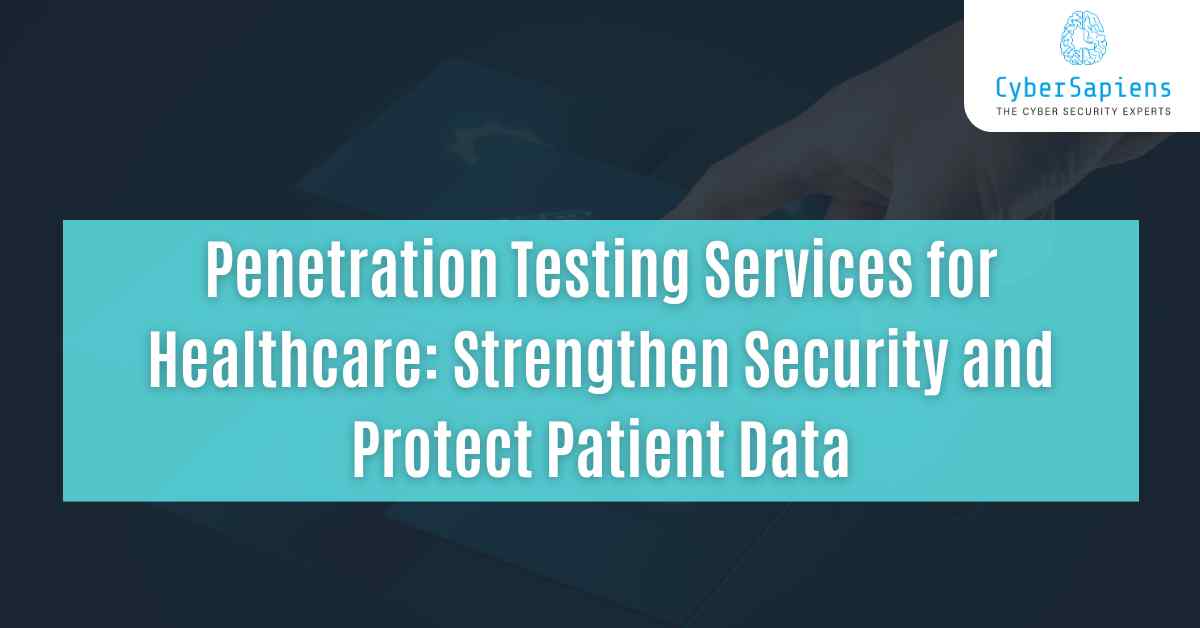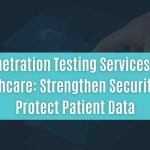The healthcare industry has become increasingly reliant on technology to store, manage, and share sensitive patient data.
While this technology has revolutionized the way healthcare is delivered, it has also introduced significant risks to the security and confidentiality of patient information.
With the rise of cyber threats, healthcare organizations must take proactive measures to protect themselves against potential data breaches.
One effective way to strengthen security and protect patient data is by utilizing penetration testing services for healthcare.
What is Penetration Testing?
Penetration testing, also known as pen testing or ethical hacking, is a simulated cyber attack against a computer system, network, or web application to assess its security vulnerabilities.
Penetration testers use various techniques, including network scanning, vulnerability exploitation, and social engineering, to identify weaknesses in the system’s defences and determine the likelihood of a successful attack.
The goal of penetration testing is to mimic the actions of a malicious hacker to test an organization’s defences and identify areas for improvement.
Why is Penetration Testing Important in Healthcare?

There is always patient’s personal information that needs to be protected in health care facilities and these include Protected Health Information (PHI) and Personal Identifiable Information (PII).
That is why the Health Insurance Portability and Accountability Act (HIPAA) and other regulating bodies set high standards for protecting patient information.
Noncompliance with these regulations leads to fines, and organisations bear the brunt of reputational risks.
Penetration testing is essential in healthcare for several reasons:
1. Protects Patient Data
Penetration testing makes organizations aware of weak links that would allow unauthorized personnel to access the patients’ information.
2. Reduces Risk
It is a significant opportunity for healthcare organizations to know the exposures that may lead to a data breach and put measures on how to avoid them.
3. Improves Compliance
Penetration testing enables healthcare organizations to show that the organization meets the requirements of seasonal regulations like HIPAA.
4. Enhances Security Posture
The healthcare sector is constantly under threat by new exploits, and penetration testing is a way of constantly updating the organization’s defences.
Top 4 Types of Penetration Tests in Healthcare
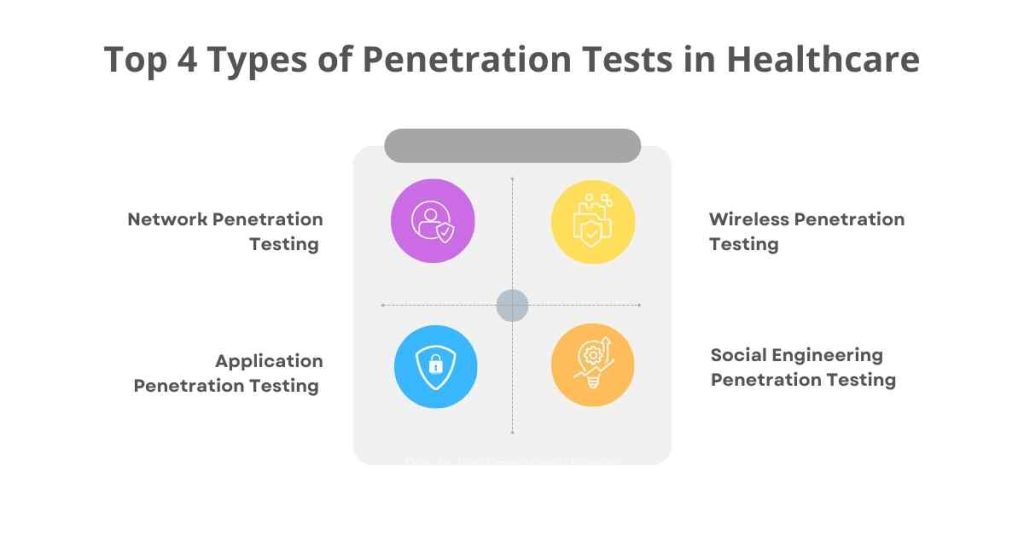
There are several types of penetration tests that healthcare organizations can utilize to strengthen their security:
1. Network Penetration Testing
This is a form of test that tests the safety of an organization’s network by mimicking an attack.
2. Application Penetration Testing
This is a kind of test that confirms the strength of the web applications and reveals the weakness that a hacker is capable of exploiting.

3. Wireless Penetration Testing
This type of test checks the laxities of a venture’s wireless net and discovers a break that can be used by hackers in attacking the system.
4. Social Engineering Penetration Testing
This kind of testing aims at ascertaining the level of readiness of an organization’s staff to resist social engineering and phishing.
Top 4 Benefits of Penetration Testing in Healthcare
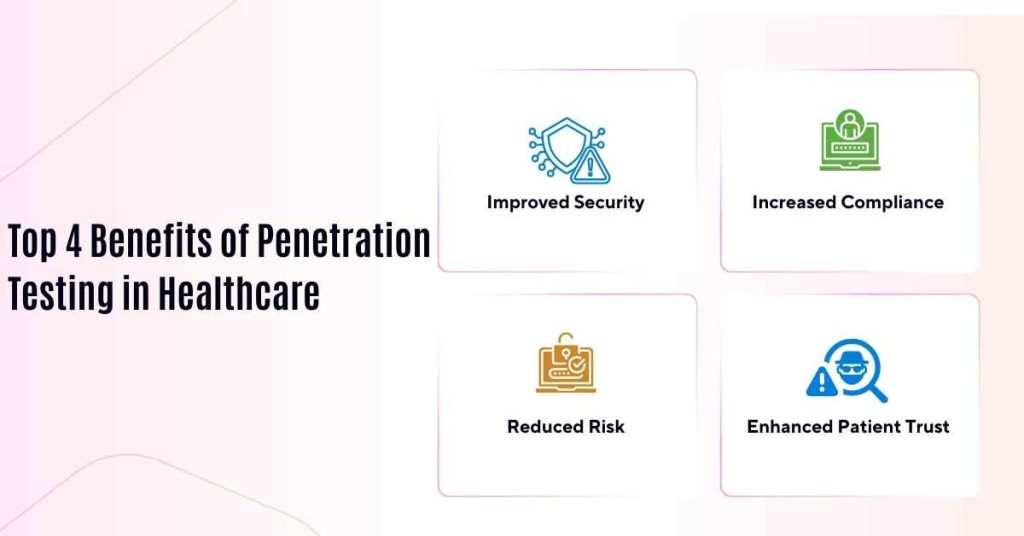
Penetration testing offers numerous benefits to healthcare organizations, including:
1. Improved Security
From another specific point of view, penetration testing is the key that helps healthcare organizations understand the issues they have and start enhancing the security condition of the organization.
2. Increased Compliance
Penetration testing assists healthcare systems in establishing compliance with rules such as the HIPAA framework.
3. Reduced Risk
Penetration testing makes sure healthcare organisations avoid the risk of a data breach as well as safeguarding patient information.
4. Enhanced Patient Trust
This, in a way, shows that healthcare organizations can save their face, and the faces of their patients, by taking measures to protect patient data.
Best Practices for Penetration Testing in Healthcare
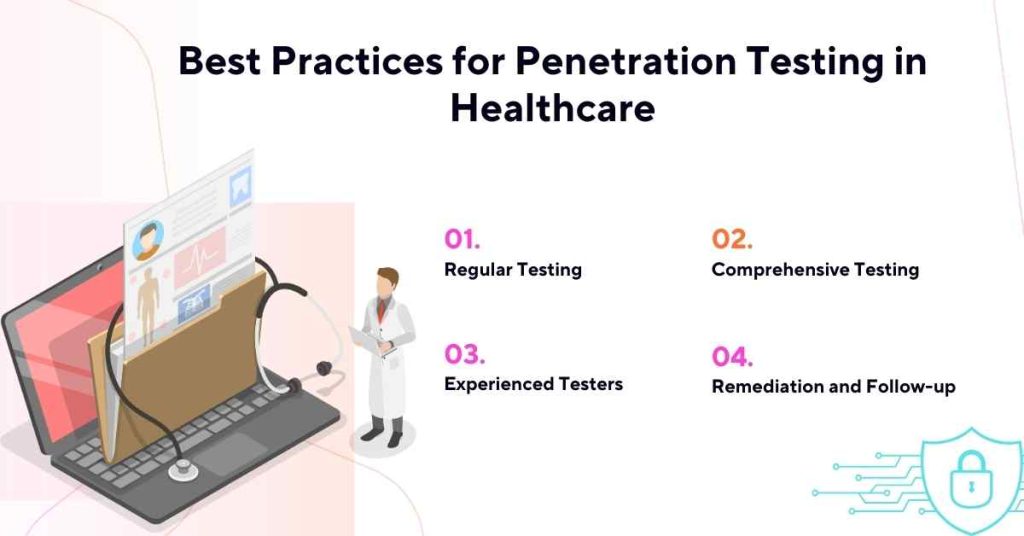
To get the most out of penetration testing, healthcare organizations should follow these best practices:
1. Regular Testing
It is recommended that penetration testing be carried out more frequently to correspond to growing threats.
2. Comprehensive Testing
Any penetration testing should cover all aspects of security in an organization as regards the network, application, wireless security as well as social engineering security.
3. Experienced Testers
Penetration testing should be best conducted by professional testers who have quite a good understanding of the security and compliance standards.
4. Remediation and Follow-up
Several practices must be done as part of penetration testing, namely; Remediation and Follow-up Testing.
Conclusion
Penetration testing is an essential security measure for healthcare organizations to protect sensitive patient data and maintain regulatory compliance.
By conducting regular penetration tests, healthcare organizations can identify vulnerabilities and weaknesses, improve their security posture, and reduce the risk of a data breach.
By following best practices for penetration testing and leveraging the expertise of experienced testers, healthcare organizations can ensure the security and confidentiality of patient data.
FAQs: Penetration Testing Services for Healthcare
1. What is the Purpose of Penetration Testing in Healthcare?
Ans: The primary purpose of penetration testing in healthcare is to simulate a cyber attack on an organization’s computer system, network, or web application to assess its security vulnerabilities and identify areas for improvement. This helps healthcare organizations to strengthen their defences, reduce the risk of a data breach, and maintain regulatory compliance.
2. How Does Penetration Testing Impact Patient Data Security?
Ans: Penetration testing plays a crucial role in protecting patient data by identifying vulnerabilities that hackers could exploit to gain unauthorized access to sensitive information. By conducting regular penetration tests, healthcare organizations can ensure the confidentiality, integrity, and availability of patient data, which is essential for maintaining patient trust and complying with regulatory requirements.
3. What Types of Penetration Tests are Available?
Ans: There are several types of penetration tests available, including network penetration testing, application penetration testing, wireless penetration testing, and social engineering penetration testing. Each type of test evaluates the security of a specific aspect of an organization’s security.
4. How Often Should Penetration Testing be Conducted?
Ans: Penetration testing should be conducted regularly, typically every 6-12 months, to stay ahead of emerging threats and ensure the security of an organization’s systems and data.
5. Who Should Conduct Penetration Testing?
Ans: Penetration testing should be conducted by experienced testers who have a deep understanding of security and compliance requirements. It is essential to work with a reputable and trustworthy third-party provider who can ensure the confidentiality and integrity of the testing process.
6. What is the Difference between Penetration Testing and Vulnerability Scanning?
Ans: Penetration testing and vulnerability scanning are two distinct security testing techniques. Vulnerability scanning identifies potential vulnerabilities in a system or network, while penetration testing simulates a real-world attack to determine the feasibility of exploiting those vulnerabilities.
7. How Does Penetration Testing Help with Regulatory Compliance?
Ans: Penetration testing helps healthcare organizations demonstrate compliance with regulatory requirements, such as HIPAA. By conducting regular penetration tests, organizations can identify vulnerabilities and weaknesses, improve their security posture, and maintain compliance.
8. What are the Benefits of Penetration Testing in Healthcare?
Ans: The benefits of penetration testing in healthcare include improved security, increased compliance, reduced risk of a data breach, and enhanced patient trust.
9. Can Penetration Testing be Done In-House or Does it Need to be Outsourced?
Ans: While some healthcare organizations may have the resources and expertise to conduct penetration testing in-house, it is often recommended to outsource this service to a reputable and experienced third-party provider. This ensures that the testing process is objective and unbiased, and that the organization can benefit from the expertise of experienced testers.
10. How Can I Get Started with Penetration Testing in My Healthcare Organization?
Ans: To get started with penetration testing, healthcare organizations should contact a reputable and experienced third-party provider to discuss their specific needs and requirements. The provider will work with the organization to develop a customized testing plan that addresses their unique security concerns and compliance requirements.


